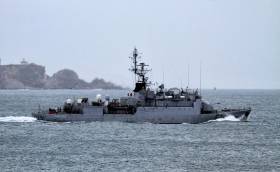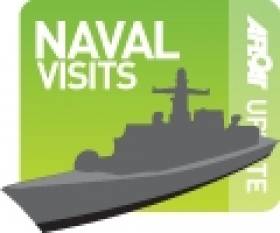Displaying items by tag: AntiSubmarine Frigate
Winter Visitor From France Makes Call to Cork City Quays
#navalvisits - A French Navy frigate docked in Cork city at the weekend having sailed from Cherbourg, Normandy though the ship is based at Brest Naval Base in neighbouring Brittany, writes Jehan Ashmore.
The 1,250 tonnes full displacement Commandant L'Herminier (F 791) according to the Port of Cork website remains berthed this morning at the city-centre’s South Quays. A crew compliment totalling almost 90 personnel consists of 7 senior officer ranks, 58 secondary officer mariners and 24 cadets.
Commandant L'Herminier is an Aviso type A69 / d'Estienne d'Orves ship that was commissioned into the French Navy having made a debut more than three decades in 1986. The 80m long class vessel designed for anti-submarine duties also carries out high sea escort missions and various other tasks.
Among the principle weaponary of the class are Exocet sea missiles and the ability to launch torpedoes. In addition equipment such as a drone that form part of a suite of surveillance operations.
A maximum 15 day duration period is available when operating in an autonomous mode. The ship's service speed is 24 knots.
French F70 Class Frigate to Visit Capital
#FrenchFrigate - Dublin Port is to welcome La Motte-Picquet (D645) a French Navy frigate capable of 30 knots and a crew of more than 230 when she visits the capital next weekend, writes Jehan Ashmore.
Displaceming 4,010 tonnes the anti-submarine Type F70 frigate of the Georges Leygues class is to berth at Ocean Pier during her four-day call.
The 139m long frigate completed in 1985 at the Brest Naval Dockyard, has a comprehensive armament in addition to carrying 2x Lynx Mk 4 helicopters.































































